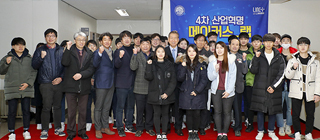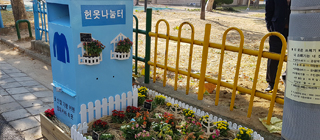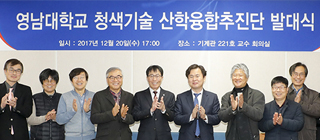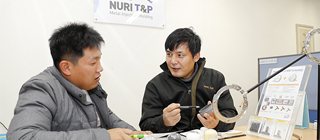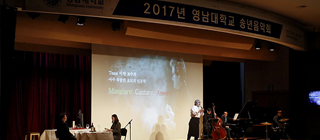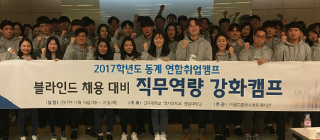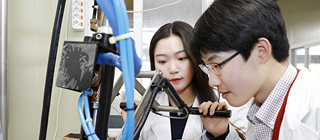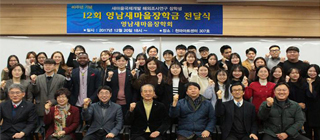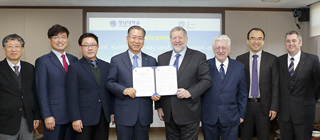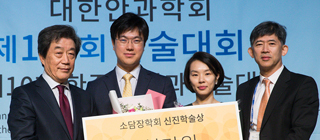-
Opening ceremony held on 8th and strengthened practical education on smart devices such as coding and 3D printers’ Expected to establish start-up foundation by supporting the commercialization of ideas and linking with other businesses [January 8, 2018] <YU opened the Makers_Lab to foster smart human resources who will lead the the 4th industrial revolution> YU (President Sur Gil-soo) opened the ‘Makers_Lab’ to fsoter creative human resources that will lead the 4th industrial revolution. On the 8th, the LINC+ project team held the ‘Makers_Lab’ opening ceremony at the Korea Institute of Industrial Technology and decided to strengthen education for practical capacities in advanced device start-ups and to support smart contents start-ups for students. With the opening of the Makers_Lab, YU plans to find and reinforce not only coding education that is the core of the 4th industrial revolution, but also practical smart information technologies using smart devices such as 3D printing, drones and robots. YU LINC+ is planning to allow any member of the university to utilize Makers_Lab at any time and is planning to include 3D printer production support and practical training in design, etc. in the educational courses to expand upon the existing start-up education. Furthermore, it is expected that the outstanding inventions of students can be commercialized or help create the foundation for start-ups by helping to link with other programs and businesses. YU President Sur Gil-soo said at the ceremony, “With the opening of the Makers_Lab, an environment for students to come up with creative ideas and utilize smart devices to build products has been constructed.” He added, “We will continue to provide full support to establish research and education infrastructure to foster smart human resources for the 4th industrial revolution.”
-
LINC+ Project Team and Suseong-gu of Daegu sings MOU and begins projects for 4 months Over 20 students from the Department of Sociology participated in town newspaper and storybook production, and environmental improvement activities [January 4, 2018] <Clothes donation box and flower garden produces by students of the Department of Sociology for the urban regeneration project> The urban regeneration project being pursued by YU (President Sur Gil-soo) is receiving attention as a new model for local development projects. The YU LINC+ team signed an MOU with Suseong-gu Office of Daegu in September of last year and began a joint project in town maintenance, urban restoration, and development of cultural tourism contents, which have been received positively by the local community. The YU LINC+ team established the Community Innovation Department within LINC+ for this project and developed and executed student-participation programs in the community together with the ‘Suseong-gu Happiness For All Urban Regeneration Support Center’. This project, which has continued for about four months from September to December, was joined by 22 students from the YU Department of Sociology. The students visited different parts of Beomeo 2-dong, Manchon 2-dong, Dusan-dong and Sang-dong to find items for urban regeneration. Students of the YU Department of Sociology pursued group projects for four months under the four themes of ▲Town newspaper production using blogs ▲Installation of ‘electric pole paintings and conscience flower pots’ in areas with frequent illegal garbage disposal ▲Development of town maps and tourist programs (photo bottom) ▲Finding town stories and producing storybooks. Students participated directly in the town’s various events and community capacity strengthening programs to make blog newspapers containing the vivid atmosphere of the city, while also interviewing townspeople to produce a town storybook. It was assessed that the young students added a young touch to what they learned by communicating directly with the community to not only promote the town, but also contributed to energizing the area through urban regeneration projects. Furthermore, in order to address one of the biggest urban problems of illegal garbage disposal, the students painted on the walls and electric poles or planted ‘conscience’ flower pots and gardens below electric poles or next to clothes donation boxes, which are common places that garbage is thrown away illegally, to promote proper garbage disposal of residents and help establish a pleasant urban environment. YU Department of Sociology senior Yoon Dong-seop (24), who participated in this project, said, “This project was a good opportunity to run around the city to identify problems of the community and to look into the community culture.” He added, “We installed ‘conscience’ flower pots with the goal of making clean alleys and because we participated directly from the planning to implementation stages, we became very attached to the outcomes. It was fulfilling as community members responded positively to our efforts.” Meanwhile, a seminar on the results of this industry-academic cooperation project of YU is scheduled to be held at the Suseong-gu Happiness For All Urban Regeneration Support Center.
-
‘Blue Technology Industry-Academic Convergence Task Force’ holds launching ceremony on the 20thto begin projects in earnest Synergy effect expected together with the Gyeongsan ‘Blue Technology Industry’ development strategy Pursuing advancement of local industries by ‘industry-academic-government’... YU to ‘lead fostering of research and human resources’ [December 21, 2017] <YU held the ‘Blue Technology Industry-Academic Convergence Task Force’ launching ceremony and will pursue research in blue technologies in earnest.> (from eight from left, YU Vice President of Education Baek Sung-ok, Gyeongsan Vice-mayor Kim Ho-jin) YU (President Sur Gil-soo) is expected to lead the fostering of research and human resources of ‘blue technologies’, which is receiving attention as the future blue ocean. ‘Blue technology’ creates highly economically efficient substances conceived from the structures and functions of natural organisms. It is innovative technology that is eco-friendly and can prevent environmental pollution, and it is receiving attention as a human-oriented sustainable blue ocean industry that can solve the decrease in jobs and income-inequality issues, which are the weaknesses of the fourth industrial revolution. YU held the launching ceremony of the ‘Blue Technology Industry-Academic Task Force’ at the Mechanics Hall conference room at 5 p.m. on the 20th and will pursue projects that will lead blue technologies in earnest. YU Vice-president of Education Baek Sung-ok, Industry-Academic Cooperation Team Leader Park Yong-wan, College of Engineering Dean Kim Seok-young, College of Mechanical and IT Engineering Shin Jae-gyun and over 20 professors possessing platform technologies on blue technologies, as well as Vice-mayor of Gyeongsan Kim Ho-jin attended the launching ceremony and agreed to have the local government and college work together to preoccupy blue technologies. In particular, Gyeongsan City has been pursuing blue technologies as the core strategy of local development to create new growth engines from this year, and has been signing MOUs with research institutes specializing in blue technologies, while making efforts for the project by organizing corporate associations with relevant companies. Through the agreement on the need for industrializing blue technologies by YU and Gyeongsan, the YU Blue Technology Industry-Academic Convergence Task Force was found and it is expected to gain synergy effects by pursuing relevant projects. YU Vice-president of Education Baek Sung-ok said, “The Green Technology Convergence Task Force will act as a base for the local governments and universities cooperate flexibly,” while adding, “YU will take the lead for procuring blue technology-based platform technologies and fostering human resources. Furthermore, by providing the cornerstone for joint development with local companies, it is expected that it will contribute to the advancement of local industries as well as the local society.” The YU Blue Technology Industry-Academic Convergence Task Force will cluster blue technology research capacities focusing on professors specializing in relevant fields such as life, nano, bio and robot engineering, while constructing a system for transferring platform technologies to companies in order for industries and academics to jointly respond to industrial paradigm shifts such as the fourth industrial revolution. Meanwhile, at the launching ceremony, the ‘blue technology convergence industrial cluster fostering project’ that Gyeongsan City is pursuing was shared, and various strategic directions fitting to local backbone industries were presented, and discussions were also held to find nationally funded projects that integrate platform technologies per expert and blue technologies. YU and Gyeongsan is planning to pursue R&D demand and strategic projects through hands-on analysis per expert field.
-
YU Start-up Incubation Center teams up with consulting company to help enter ‘start-up’ markets Implemented ‘YU-VPT’ program… Online sales of virtual products to ‘pre-confirm marketability’ Participated by 12 companies to launch new products and succeeded in increasing clients... Some companies increase sales [December 18, 2017] <‘Nuri T&P’, a precision parts production technology start-up, participated in YU’s Start-up Incubation Center’s YU-VPT and succeeded in the commercialization of ‘Metal Powder Jettison Technology’.> Start-ups pursuing industry-academic cooperation with YU successfully entered the market one after the other. Many start-ups successfully launched new products or increased their client based. Some companies even recorded 150% growth in sales compared to the previous half year and are showing signs of hitting the jackpot. The common denominator of these companies are that they are start-ups that entered the market by applying the ‘YU-VPT (Yeungnam University-Value Proposition Test’ designed by the YU Start-up Incubation Center. The ‘YU-VPT’ is a ‘customer value verification test’ for new venture companies being pursued by the YU Start-up Incubation Center together with Insightors, a business model innovation consulting company. YU Start-up Incubation Center Director Park Chang-hyun said, “According to a press release by the Ministry of Strategy and Finance, 85% of start-up companies closed down within three years. The major cause of this is because it does not launch products wanted by the market. Through the YU-VPT, it is possible to find out what products customers want and whether they will actually purchase the product.” A total of 12 start-ups participated in the ‘YU-VPT’ that was implemented for the first time this year. The YU Start-up Incubation Center and Insightors made virtual images and advertises of products that companies are developing and made online sales tests through social media platforms, etc. Test results were very successful. Among them, eight companies had extremely good outcomes. Major start-ups with outcomes through the YU Start-up Incubation Center’s ‘YU-VPT’ no Company CEO Product Performance (first half of 2017 compared to second half of 2016) 1 S.Melin Shin Ah-young Heated hair-roll Developed new client base and increased sales by 60% 2 Nuri T&P Kim Dong-woo Metal powder jettison process Developed new client base and increased sales by 20% 3 Haga Ryu Sook-hee Multi IQ test application Improved app service 4 Hall N Tech Seo Jong-yeol Garlic and vegetable mincer Came up with ideas to improve new products and applied in new products 5 Freshville Kim Geun-hwa Vegetable and fruit and oriental herbs beverage for children Developed new product and successfully supplied PB products for 150% increase in sales 6 MR Industries Kim Tae-gyo Light-weight concrete using recycled aggregate Improved product leading to 15% increase in sales 7 Gennolab Kim Young-hoon Functional cosmetics Procured sales channel for foreign markets 8 Dreams and Pine Trees Jang Yeon-hee Adult diapers Developed new core client base leading to 4% increase in sales Insightors CEO Hwang Hyun-cheol said, “Through tests, we were able to procure the actual behavior data of customers such as number of clicks compared to advertisement exposures and purchasing ratio after reviewing advertisements.” He added, “Participating companies were able to reflect information obtained through ‘YU-VPT’ such as ‘Who is interested in this product’, ‘What is the motive for purchasing this product’, ‘Is the price appropriate’, etc. to be effective in the market.” Unlike conglomerates that can utilize various marketing tools before launching their product, most start-ups launch their products without verification procedures due to money, time and personnel issues. ‘YU-VPT’ is anticipated to be a program that will enhance success possibilities for new companies. This has become a representative success case of industry-academic cooperation that supports start-ups by college students and fostering of venture companies. S.Melin, a women’s hair-roll manufacturing company started up by YU students participated in the YU-VPT and recently launched a new product to expand their customer base. S.Melin CEO Shin Ah-young (24, YU Department of International Trade, senior, photo on right) said, “The biggest concern of our company was that our clients were limited to teenagers. We wanted to know the answer to the question on who in their 20s are our customers and what product do they want.” She added, “We tested a number of variables such as size of the hair roll, materials and commercial model through YU-VPT. In result we made various attempts for change such as thickness of the hair roll, improving the image, changing materials, and changing the age of the model, which led to the successful launching of a new product.” ‘Freshville (CEO Kim Geun-hwa)’, a baby juice manufacturing company located in Gyeongbuk, developed a functional beverage and after the ‘YU-VPT’, it signed a contract with a supermarket and began delivering its products. ‘YU-VPT’ was also successfully applied in the industrial materials market as well. The precision parts production technology start-up ‘Nuri T&P (CEO Kim Dong-woo, Yeo Hang-hyun)’ checked the difficulties and purchase intent of small precision parts companies, which are its main clients, and has successfully began pursuing the commercialization of the ‘metal powder jettison technology’, which is a new parts production technology. YU Industry-Academic Cooperation Team Director Park Yong-wan said, “A systematic and scientific approach is needed for the success of start-ups. However, small start-ups lacking expertise has limitations in gaining confidence on what products customers want and whether they would purchase the product even if they run around interviewing customers.” He added, “From the perspective of start-ups, YU-VPT will be a program that tests customer reactions in actual market environments to make products that customers truly want.”
-
Over 300 people including faculty, students and alumni enjoy concert on the 21st at the Cheonma Art Center ‘Mangiare, Cantare, Amore’ Overseen by Vocal Music Professor Lee Hyun [December 21, 2017] YU (President Sur Gil-soo) held the ‘2017 Year-end Concert’ and received huge responses by students and faculty members. At the ‘2107 Year-end Concert’ held at the YU Cheonma Art Center Chamber Hall at 2 p.m. on the 21st, a total of more than 300 people including YU president Sur Gil-soo and faculty and students came to enjoy the recital. This concert was planned out to end the year with YU professors, employees and students to communicate and spend a good time together. This concert was made even more special with the attendance of not only YU members, but also alumni including YU General Alumni Association Senior Vice-president Jung Tae-il. This year-end concert overseen by YU Vocal Music Professor Lee Hyun was held under the theme ‘Mangiare (Eat), Cantare (Sing), and Amore (Love)’. The curtains were raised with Professor Lee Hyun singing ‘Hamangyeon’. Vocalist Kwon Sung-joon who gained fame by appearing on JTBC Phantom Singer 2, Soprano Lee Joo-hee and Clarinetist Kwon So-min performed together with the piano, contra bass and drum to offer a simple, yet elegant year-end concert. Together with the vocal songs, dance sport players presented a tango performance to make a good concert even better. YU President Sur Gil-soo said, “Rather than hold a regular closing ceremony, we organized a small concert so that the members of YU could finish off the year in a comfortable fashion.” He added, “I would like to thank the alumni association who helped YU enjoy such a great concert. I ask that all of the members of YU work together next year too for the development of our school.”
-
‘College Job Center Alliance Employment Camp’ held by the Lotte HR Development Center from the 19th to 21st 90 students preparing for jobs from YU, Konkuk University and Myungji University participates in the employment camp 2 night/3 days training on filling out applications and resumes and holding mock interviews [December 21, 2017] YU and major universities of Seoul teamed up to improve the chance of obtaining desired jobs for students and those preparing for jobs. YU, Konkuk University and Myungji University held the ‘2017 2nd College Job Center Alliance Employment Camp’. At this alliance employment camp held at the Lotte HR Development Center in Osan, Gyeonggi-do for two nights and three days from the 19th to 21st, a total of 90 participants, 30 from each university, participated. This is the second alliance employment camp since the first camp joined by 120 students from YU, Konkuk University, Myungji University and Chosun University at the Daewoong Management Development Institute in June. This employment camp supervised by the YU College Job Center was organized to strengthen the employment capacities of university students in preparation for the employment season in the first half of 2018. Current corporate HR personnel and employment experts participated in the event to contribute to the job capacity school, writing applications and resumes, and holding mock interviews. Training on employment strategies for blind hiring, team-building and work analysis were held on the first day. On the second day, students learned about writing applications, practiced speech and voice, and held mock interviews. On the last day of the camp, the participants held mock interviews in detailed stages to strengthen their capacities to gain employment. Kim Ho-hyeon (26, graduated from the YU School of International Economics and Business) said, “After participating in the employment camp with schools from other universities, I was able to learn about the different strengths and weaknesses, and it was an opportunity for me to gain an objective view on how prepared I am to search for jobs.” He added, “I have become more motivated through this camp and I will do all I can to join the company I want early next year.” YU College Job Center Director Kang Seok-bok said, “I hope that the students of the three universities that will compete fairly during their course of gaining employment will be able to check each other’s strengths and weaknesses through this alliance employment camp and benchmark each other to upgrade their job capacities.” He added, “The College Job Center will also develop various employment capacity strengthening programs to provide full support to help students gain employment as they desire.” Meanwhile, YU was selected for the College Job Center supported by the central and local governments of YU and thus founded the YU College Job Center organized directly under the university president in April of this year. The College Job Center is co-operated by the Ministry of Employment and Labor, universities and local governments so that current students, graduated students and youths in the area can easily receive career guidance and employment support services. There are currently 12 full-time consultants in the YU College Job Center who provide customized career and employment counseling to students, while also offering various employment capacity strengthening programs.
-
Applied for patents using knowledge learned during class as sophomores and registered patent before graduating Developed ‘fusion device’ with improved productivity and economic feasibility that can produce high quality metals Can be used in research centers related to metal... Currently being used in undergraduate research labs [December 20, 2017] YU students developed a device using knowledge they learned in their major to register a patent. The patent that they registered is the ‘Fusion device (patent no. 10-1790431), and its inventors are registered as YU School of Materials Science and Engineering Professor Park No-geun (36), Baek Seung-min (26, graduated from YU School of Materials Science and Engineering), senior Shin Yoon-ji (22, left on photo), and Lee Dong-hee (22, right on photo). The patent was applied for in March of last year and recently registered and gained more interest as Shin Yoon-ji and Lee Dong-hee designed this based on what they learned in class as sophomores and registered the patents while still being enrolled in undergraduate school. The patent that they registered is a technology that suppresses oxidation reactions that occur in the melting and cooling process of metal materials. They applied what they learned in the ‘Material Equilibrium’ class (Advising Professor Park No-geun’, which is a major class of the School of Materials Science and Engineering, during the second term of 2015, The patent inventor Shin Yoon-ji said, “In existing fusion devices, there is a huge loss with a collection rate of only 60-65% when solidifying the melted materials during metal casting. The fusion device that we developed improved productivity by increasing the collection rate to about 80%. Furthermore, other melting equipment used expensive vacuum facilities to prevent oxidation of metals, but our patented technology can suppress oxidation reactions of metals while using relatively cheaper vacuum equipment, making it possible to produce less expensive, yet high quality metals.” <School of Materials Science and Engineering Senior Shin Yoon-ji and Lee Dong-hee is conducting research on the patented fusion device that they developed.> The patented technology can be used in metal-related research labs and it is expected to help improve metal properties testing and on research for enhancing metal functionalities. The patented device is currently being used for research and testing at the YU School of Materials Science and Engineering. Lee Dong-hee revealed his future research plans saying, “I want to participate in more in-depth research in the alloy design field by enrolling in graduate school.” Professor Park No-geun said, “The students showed great interest in their majors, and continuously worked on identifying and resolving pending issues as students of engineering, which led to the achievement of registering a patent while still in school.” He added, “Having intellectual property rights as an undergraduate student is a priceless experience. It will serve as an opportunity for them to do more in-depth research in their majors at graduate school.”
-
38 selected for ‘overseas studies scholarship students’ in commemoration of the 40th years since the founding of the Department of Saemaul and International Development 3 international students from Africa and Vietnam also selected for scholarships Scholarships given every since 2006 to give 180 million won to a total of 184 students [December 21, 2017] <The YU Saemaul Scholarship Association held the 12th Scholarship Ceremony on the 20th> The YU Saemaul Scholarship Association (Chairman Choi Wae-chul, Professor of the YU Department of Saemaul and International Development) held its 12th scholarship ceremony at the YU Cheonma Art Center on the 20th in commemoration of the 40th year anniversary of the department. The scholarship provided by the YU Saemaul Scholarship Association gave a total of 40 million won by selecting ‘foreign studies scholarship students’ to fit the characteristics of the department that fosters experts to solve global issues in commemoration of the 40th year anniversary of the YU Department of Saemaul and International Development. Students selected for scholarships will visit countries such as Vietnam, Myanmar, Singapore, Indonesia, Laos, Thailand, Cambodia, China, Japan, England, Germany and France to examine and research the development cooperation cases of international organizations as well as the policy cases for the development of emerging nations. There were a total of 38 students selected for scholarships in 2017 from nine teams including the ‘Do You Love Saemaul’ team. The selected scholarship students included international students who came to study at the Department of Saemaul and International Development. Chimereze Eden Nwaogu (bottom photo – left), a sophomore who came to study at YU from Gabon, Africa and Le Ngoc Tram and Le Khanh Nhat who are juniors from Vietnam make up the three international students. The overseas studies scholarship students selected will write a report after completing their overseas studies and share their research results with each other. Park Sae-woong, a sophomore in the School of Economics and Finance, who participated as an affiliate major to practice diligence, independence, cooperation and sharing, volunteering, and a creative spirit, was also selected for the scholarship. The YU Saemaul Scholarship Association was founded by alumni who studied in the Department of Local Social Development of YU that was founded in 1976 to support their juniors in their studies. The Association was organized in 2003 through the efforts of Chairman Choi Wae-chul, who was the first student in this department, and other graduates. Scholarships are being given every year since 2006 and a total of 182 million won was provided as scholarships to 184 students up until this year. At this ceremony, Chairman Choi Wae-chul said, “I am very happy that our association that aims at returning the scholarships that we received as students to other students is able to give scholarships for the 12th time, and I would like to thank everybody for their support.” He added, “It is now time to focus not only on the development of Korea, but also the international community who funded Korea with 12.77 billion dollars in the past. I hope that students of the Department of Saemaul and International Development will gain more capacities to become experts for solving common global issues to repay the international community, pioneer new paths for the future generation, encourage younger students, and contribute to social development.” YU College of Political Science and Public Administration Dean Kim Jung-hoon, Gyeongbuk Sports Association for the Disabled Secretary-general Kim Jung-il (former Vice-mayor of Sangju), Daegu Women and Family Policy Officer Ha Young-sook, YU Saemaul Scholarship Association Secretary-general Lee Gyeong-seop, Palgong MNC CEO Kim Jing-young, Professors Kang Dong-pil, Lee Jung-joo and Lee Mi-sook, and other alumni currently working different parts of society attended the ceremony to encourage junior students. Meanwhile, the YU Department of Saemaul and International Development graduated a total of 1,757 students up until now. The Saemaul Undong, which was registered as a world heritage by UNESCO, was organized as Saemaul studies and has been receiving attention as a department that fosters human resources who will address overcoming poverty and local development issues, who are joint challenges of the international community. In particular, the Department of Saemaul and International Development has been evaluated as a core department that exports Korea’s unique studies such as establishing the Department of Saemaul and Economic Development at Enderun University in the Philippines.
-
Agreed on student, professor and research exchange and joint research in the carbon fiber industry Planning to expand exchange to various fields such as join diploma programs Synergy effect expected by constructing a government-academic-research-industrial cluster through the establishment of the Gyeongsan AMRC Asia Hub Center [December 13, 2017] <On the 13th, YU and the University of Sheffield of England signed an international academic exchange MOU.> (From fourth on left, YU President Sur Gil-soo and AMRC Chairman Keith Ridgway) YU (President Sur Gil-soo) and The University of Sheffield signed an academic exchange MOU. The University of Sheffield is a prestigious national university of England located in Sheffield, South Yorkshire County. With this MOU, the two institutes agreed on exchange of undergraduate and graduate school students, professors and researchers, as well as international joint research. At the MOU signing ceremony held at the YU President’s Reception Room at 2 p.m. on the 13th, YU President Sur Gil-soo, Department of Fiber System Engineering Dean Kim Sam-soo, Professor Lee Jae-woong, and External Cooperation Office Director Lee Hee-wook, while AMRC (Advanced Manufacturing Research Centre) Keith Ridgway, Vice President John Baragwanath, Center Director Richard Scaife, and AMRC Korea Director Lee Jung-hwan representing the University of Sheffield, and Gyeongsan Vice Mayor Kim Ho-jin, and the US Embassy in Korea Science Technology Team Leader Gareth Davies attended the event. YU President Sur Gil-soo said, “By signing an academic exchange agreement with the University of Sheffield that graduated multiple Nobel Prize winners, our two universities now have the foothold to gain world-class research capacities.” He added, “Starting with personnel exchange and joint research related to the carbon fiber industry, we hope to expand our exchange to other fields as well.” Chairman Keith Ridgway replied, “As AMRC is pursuing the construction of a research center with local authorities such as Gyeongsan City and discussing plans to construct infrastructure related to the carbon fiber industry, we hope that exchange with YU will be pursued successfully. We hope for broad-ranged academic exchange with the university such as in operating joint diploma programs. AMRC (Advanced Manufacturing Research Centre) is an advanced manufacturing technology research institute co-founded by the University of Sheffield and Boeing in 2001. Over 100 member companies around the world including Rolls Royce are currently participating in joint R&D of products such as the carbon fiber industry. AMRC is planning to build the Asia Hub Center in Gyeongsan for the first time overseas. AMRC is pursuing the carbon fiber industry development project together with local governments such as Gyeongsan and local companies, and through this exchange with YU, it is expected to gain synergy effect through its global government-academic-research-industrial cluster.
-
